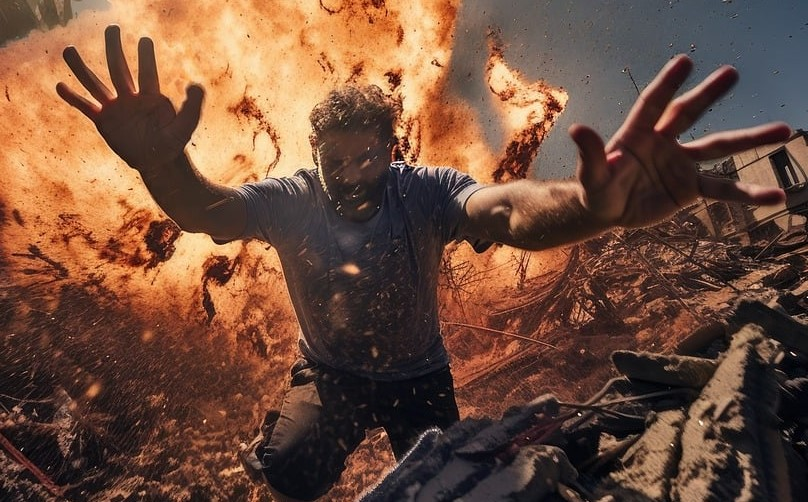The following is the excerpt from the recent book published: The Psychology of Mature Societies: Reflecting on Sociocultural Blueprints (2023).
In the context of the Israel-Palestine conflict, akin to a sibling rivalry in psychology, the absence of a neutral, empathetic entity to guide and mediate the disputes has perpetuated a cycle of violence and mistrust. The initial approach by Britain, which can be perceived as a “parental” figure, was arguably neutral but employed a divide-and-control policy, which may have sown seeds of discord rather than unity.
Historically, the British Mandate in Palestine (1920-1948) aimed to implement the Balfour Declaration, which promised a “national home for the Jewish people” in Palestine. However, the mandate also recognized the civil and religious rights of the existing non-Jewish communities. The conflicting promises to both Jewish and Arab communities and the subsequent withdrawal of the British without a clear path to resolution left a power vacuum and a legacy of division.
Roland Kim’s model emphasizes the evolution of societies through stages, culminating in a Stage 5 society where emotional maturity, empathy, and collective well-being are paramount. In such a society, effective communication, adherence to agreements, and a commitment to understanding and valuing diverse perspectives are key.
The model emphasizes emotional maturity and collective well-being. In the context of the Israel-Palestine conflict, this would mean both parties engaging in dialogues and negotiations with a genuine understanding and empathy toward each other’s histories, traumas, and aspirations. The Oslo Accords in the 1990s, which aimed to establish a framework for peace, could have been a step towards this, but the failure to realize the promises of these accords demonstrates the challenges in achieving such dialogue.
The emotional and psychological dimensions of the Israel-Palestine conflict are profound. The Palestinians might perceive themselves as abandoned children, especially considering the substantial support Israel receives from powerful Western nations. On the other hand, the Jewish population, still shadowed by the horrors of the Holocaust, may harbor unresolved traumas that influence their defensive and protective stance.
For Palestinians, the Nakba (the 1948 Palestinian exodus) and subsequent events have been traumatic, while Israelis have faced constant security threats and military conflicts. Both communities harbor deep-seated fears and traumas that influence their perspectives and reactions toward each other, perpetuating a cycle of mistrust and aggression.

An empathetic entity, capable of understanding, validating, and addressing the traumas and emotional pains of all parties involved, is crucial. This entity should facilitate a space where both Israelis and Palestinians can express their fears, grievances, and aspirations without judgment or retaliation.
The role of an empathetic mediator, which could be an individual, a country, or an international organization, is to facilitate dialogue without imposing solutions. The Quartet on the Middle East, comprising the United Nations, the United States, the European Union, and Russia, was established in 2002 to mediate the peace process but has faced challenges in maintaining neutrality and effectively facilitating negotiations.
The involvement of external entities, such as the U.S., is complex due to various political, financial, and social ties, which may hinder their capacity to act as neutral mediators. The analogy of the U.S. grappling with its own internal issues, such as gun control, reflects the challenge of navigating policies amidst powerful opposing forces.
The U.S., despite being a key player in mediating the conflict, has often been perceived as biased towards Israel, given the significant political and financial support. Similarly, other countries or entities that might mediate are often perceived as having biases, complicating the peace process. The U.S. provides Israel with substantial military aid, while also being home to a significant Palestinian diaspora, reflecting its complex role in the conflict.
In envisioning a resolution, the principles of a Stage 5 society can be instrumental. A collaborative, inter-independent approach, where both Israelis and Palestinians work towards a shared future while respecting and valuing their distinct identities and narratives, is vital. This involves transcending the “eye for an eye” mentality and fostering a space where shared humanity is recognized above all else.
A future solution might involve recognizing the legitimate aspirations and rights of both Israelis and Palestinians. The two-state solution, which envisions independent Israeli and Palestinian states coexisting side by side, has been the predominant international approach since the mid-20th century, but its realization has been hindered by numerous challenges, including issues related to borders, refugees, and the status of Jerusalem.
The Israel-Palestine conflict is deeply complex and multifaceted, with varied narratives and perspectives. It’s crucial to approach the topic with sensitivity and a commitment to presenting a balanced view, acknowledging the legitimate aspirations and grievances of all parties involved.
Though the path towards peace and resolution in the Israel-Palestine conflict is undeniably complex and fraught with challenges, by integrating the principles of emotional maturity, empathy, and collaborative coexistence from the Stage 5 societal model, there may yet be a pathway towards a future where both nations can coexist harmoniously, healing from the traumas of the past and building a future anchored in mutual respect and shared aspirations.
Kim, R. (2021a). The Five Stages of Civilization: An integrated psychological and psychoanalytic perspective, Personality development. Living Free Publishing.
Kim, R. (2021b). The Five Stages of Civilization: From an Integrated Psychological and Psychoanalytic Perspective Vol. II Socio-cultural Development. Living Free Publishing.
Kim, R. (2023). The Psychology of Mature Societies: Reflecting on Sociocultural Blueprints Living free publishing Co.
Kim, R. (2022). Silent Trauma of Childhood: A Seed of Depression, Anxiety, Suicide, and Homicide. Living Free Publishing.